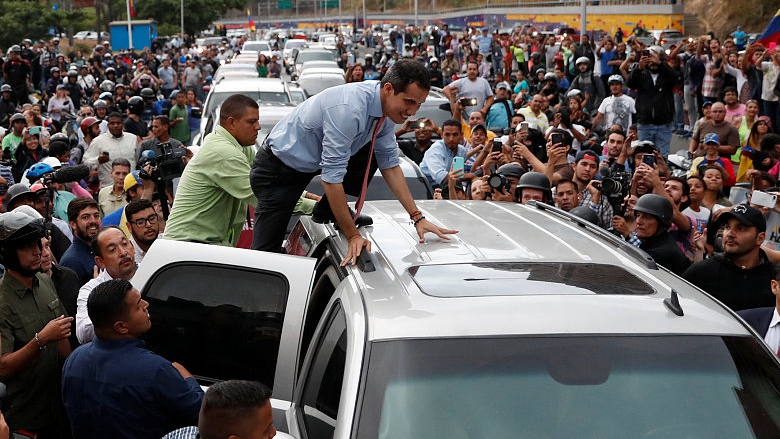
TV Show
09:50, 13-Mar-2019
Who to blame for tensions in Venezuela
The Heat
01:15

Venezuela has entered the sixth day of a blackout. Power was restored to some areas of the country over the weekend, but service only lasted just a few hours before dropping out again.
Venezuela's opposition-run congress on Monday declared a "national state of emergency" for the blackout which came at a time when Venezuela is plagued by economic despair, including shortages of goods and food. Maduro accused U.S. President Donald Trump of cyber "sabotage" that plunged the South American country into its worst blackout on record.
While the U.S. has a history of intervention in Latin America, what is now driving Washington's policies in Venezuela, Cuba and Nicaragua?
U.S. Secretary of State Mike Pompeo made a harsh statement Monday regarding Venezuela issue: "No nation has done more to sustain the death and daily misery of ordinary Venezuelans including Venezuela's military and their families, than the communists in Havana. Cuba is the true imperialist power in Venezuela. ...I even hear that Maduro has no Venezuelans around him."
Cuban journalist and commentator Cristina Escobar disagrees that there is no evidence to back up Pompeo's statement. "The lies and the constant propaganda to push a war on Venezuela is a reality," she says.
Jefferson Morley, who is a former reporter at the Washington Post and the author of three books on the CIA, thinks that President Trump does not care about Venezuela except making it a socialism issue to attract voters in the 2020 election.
The U.S. has a long history of meddling with Latin American issues. Alan Macpherson, who is based in Temple University in Philadelphia, argues the return is not obvious yet while Venezuela is larger than any other country in Latin America that the United States has intervened in before.
Jefferson believes that we are seeing a confrontation at a greater level after repetitive misleading propaganda and confrontation from the U.S. side.
"We are not afraid to use the phrase Monroe Doctrine," said U.S. National Security Advisor John Bolton. He states that since President Reagan's era, America's goal is to have a completely democratic hemisphere, where Venezuela is in.
Lester Munson, a principal in the International at BGR Group (Barbour, Griffith & Rogers), says Venezuela's economic and humanitarian situation is deteriorating. He points out that the U.S. has built up support for Venezuela's policy with the Lima group and most of the international community is arrayed against Maduro, yet the U.S. isn't intervening militarily. The U.S. is putting a lot of pressure on Venezuela to move towards democracy and to move towards a better humanitarian situation.
Cristina indicates that whoever is a patriot in the Latin American countries would be extremely offended by John Bolton's statement. "The Monroe Doctrine is the most imperialistic perspective," she says.
In her opinion, oil is the ultimate reason for the U.S. to focus on Venezuela instead of Haiti or Honduras, where the attention was shifted from. Promoting democracy and human rights is only superficial reasoning for the hypocrisy, yet thousands of Cuban families were damaged or separated because of the U.S. intervention in the past.
More importantly, Jefferson is concerned that the aloud expression of Monroe Doctrine would only make Venezuela more cohesive as a nation, therefore opposing further U.S. meddling.
He indicates that the more the U.S. can work with other countries in the region to make it look like a real genuine effort, the more effective it will be.
The Heat with Anand Naidoo is a 30-minute political talk show on CGTN. It airs weekdays at 7:00 a.m. BJT and 6:00 p.m. Eastern in the United States.
(If you want to contribute and have specific expertise, please contact us at opinions@cgtn.com.)

SITEMAP
Copyright © 2018 CGTN. Beijing ICP prepared NO.16065310-3
Copyright © 2018 CGTN. Beijing ICP prepared NO.16065310-3